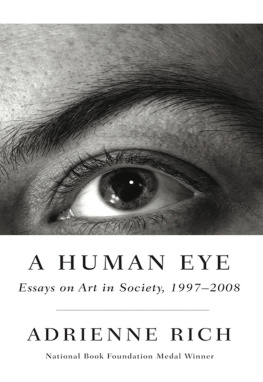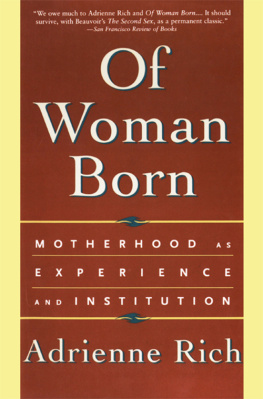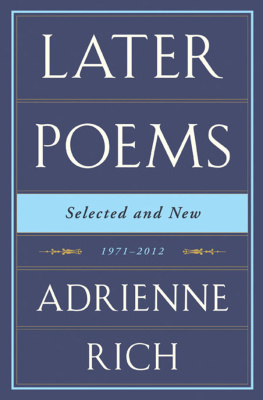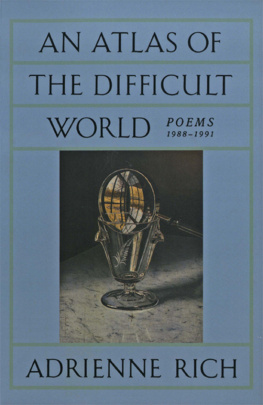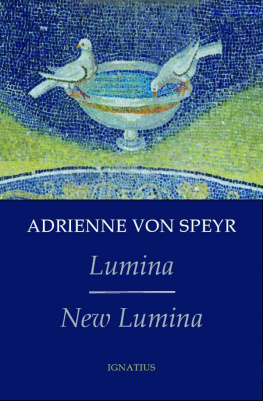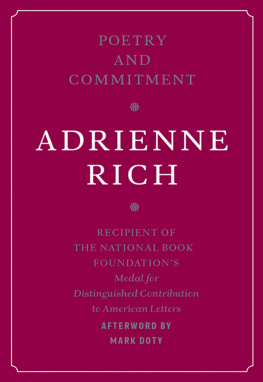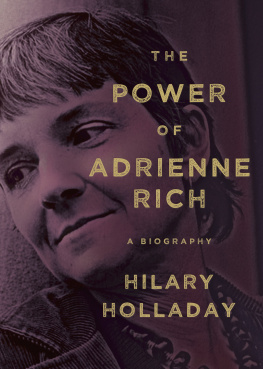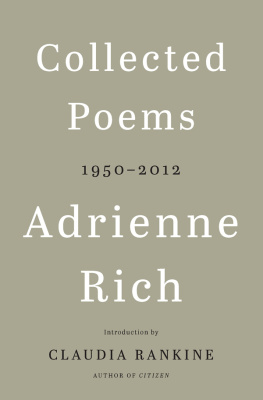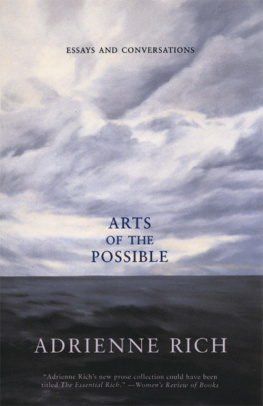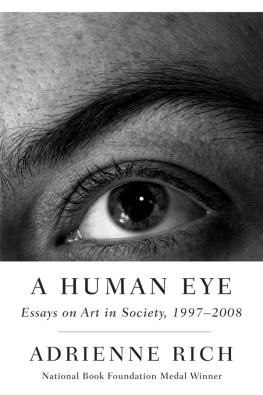Adrienne Rich - A Human Eye: Essays on Art 1997-2008
Here you can read online Adrienne Rich - A Human Eye: Essays on Art 1997-2008 full text of the book (entire story) in english for free. Download pdf and epub, get meaning, cover and reviews about this ebook. year: 2009, publisher: W.W. Norton, genre: Art. Description of the work, (preface) as well as reviews are available. Best literature library LitArk.com created for fans of good reading and offers a wide selection of genres:
Romance novel
Science fiction
Adventure
Detective
Science
History
Home and family
Prose
Art
Politics
Computer
Non-fiction
Religion
Business
Children
Humor
Choose a favorite category and find really read worthwhile books. Enjoy immersion in the world of imagination, feel the emotions of the characters or learn something new for yourself, make an fascinating discovery.
- Book:A Human Eye: Essays on Art 1997-2008
- Author:
- Publisher:W.W. Norton
- Genre:
- Year:2009
- Rating:3 / 5
- Favourites:Add to favourites
- Your mark:
- 60
- 1
- 2
- 3
- 4
- 5
A Human Eye: Essays on Art 1997-2008: summary, description and annotation
We offer to read an annotation, description, summary or preface (depends on what the author of the book "A Human Eye: Essays on Art 1997-2008" wrote himself). If you haven't found the necessary information about the book — write in the comments, we will try to find it.
A Human Eye: Essays on Art 1997-2008 — read online for free the complete book (whole text) full work
Below is the text of the book, divided by pages. System saving the place of the last page read, allows you to conveniently read the book "A Human Eye: Essays on Art 1997-2008" online for free, without having to search again every time where you left off. Put a bookmark, and you can go to the page where you finished reading at any time.
Font size:
Interval:
Bookmark:

Human
Eye
Telephone Ringing in the Labyrinth: Poems 20042006
Poetry & Commitment: An Essay
The School Among the Ruins: Poems 20002004
What Is Found There: Notebooks on Poetry and Politics
The Fact of a Doorframe: Poems 19502000
Fox: Poems 19982000
Arts of the Possible: Essays and Conversations
Midnight Salvage: Poems 19951998
Dark Fields of the Republic: Poems 19911995
Collected Early Poems 19501970
An Atlas of the Difficult World: Poems 19881991
Times Power: Poems 19851988
Blood, Bread, and Poetry: Selected Prose 19791985
Your Native Land, Your Life: Poems
Human
Eye
E SSAYS ON A RT IN S OCIETY
19972008
W. W. NORTON & COMPANY
NEW YORK LONDON
Copyright 2009 by Adrienne Rich
All rights reserved
For information about permission to reproduce selections from this book, write to Permissions, W. W. Norton & Company, Inc., 500 Fifth Avenue, New York, NY 10110
Production manager: Devon Zahn
Library of Congress Cataloging-in-Publication Data
Rich, Adrienne Cecile.
A human eye: essays on art in society, 19962008 / Adrienne Rich.1st ed.
p. cm.
Includes bibliographical references.
ISBN: 978-0-393-07139-9
1. PoetryHistory and criticism. Art and society.
3. Social change in literature. I. Title.
PS3535.I233H86 2009
814'.54dc22
2008049972
W. W. Norton & Company, Inc., 500 Fifth Avenue, New York, N.Y. 10110
www.wwnorton.com
W. W. Norton & Company Ltd., Castle House, 75/76 Wells Street, London W1T 3QT
I AM GRATEFUL to those who instigated some of these essays or made a place for others: Mercury House; Poetry International Web Steve Wasserman, former editor of the Los Angeles Times Book Review; Tony Kushner and Alisa Solomon, editors of the anthology Wrestling with Zion; the late Alexander Taylor at Curbstone Press; the literary estate of June Jordan and Copper Canyon Press; Ted Genoways at the Virginia Quarterly Review; Ocean Press (Australia); Geoffrey OBrien at the Library of America; University of Stirling in Scotland; the Center for Lesbian and Gay/Queer Studies at the City University of New York; the Boston Review ; and Jill Bialosky and her colleagues at W. W. Norton & Company for publishing the pocket edition of the lecture Poetry and Commitment, here reprinted as Poetry and the Forgotten Future.
As for the poets, thinkers, writers whose words Ive dwelt on here, my debt is of course incalculable. I hope this collection may draw other readers to writing that has cleansed the air for me in badly smogged times. Gathering the essays for this volume, Ive recognized that together they describe a wider arc: not simply one readers preferences and choices but an ardent conversation among the quick and the dead, different generations, histories, temperaments.
Ive written here mostly about poetry, as it moves through human lives: one activity among many, the art I know best from inside. Throughout I pursue questions of art and political transformation, questions already broached by others, especially in socialist traditions but, in current monologues of marketing and mediocrity, derided or shrugged off along with the socialist vision itself.
Karl Marxhumanist philosopher and social psychologist that he wasdescribed how in the compulsive expansion of capital human senses become starved, reduced to the mere sense of ownership: an object is only ours when we have it, when it exists for us as capital, or when it is directly eaten, drunk, worn, inhabited utilized in some way.
He also observed: The eye has become a human eye only when its object has become a human , social object. When artas language, music, or in palpable, physically present silencecan induce that kind of seeing, holding, and responding, it can restore us to our senses.
And what apprehension, what responsibility then?
Adrienne Rich
2008
Human
Eye
Dream of Order
Sometime in the 1990s the mail brought a literary magazine entitled The Bastard Review , with a letter from its editor, Thomas Avena, asking for poems. The quality and range of poetics interested me, as the promised method of payment appealed to me: a package of smoked salmon to be shipped from San Francisco. I sent poems, and the smoked salmon duly arrived. In the same issue was a poem addressed to Alan Turing, the gay British mathematician who cracked the Nazi Enigma code during World War II, later to be convicted of Gross Indecency, committing suicide two years later. What struck me in the poem was the poise within its tension, the intimate tenderness of the speakers voice. This was to become the opening poem of Avenas Dream of Order (1997), for which I wrote the foreword that follows (in slightly revised form.)
Avena was an artist, an activist, and editor of the anthology Life Sentences: Writers, Artists, and AIDS (San Francisco: Mercury House, 1994). He also curated the Smithsonian AIDS history project Face to Face. Living with lymphoma and with many beloved seropositive comrades, Avena was determined to make explicit, investigate, and articulate life and art in the face of debilitating illness and treatments, not to mention official denial. He died at forty-six in 2005, leaving a still-unpublished second book of poetry, Magi , and an unfinished expansion of Marinol, his personal essay in Life Sentences .
We became friends, though we met rarely; once, he and his then lover, William Lyon Strong, cooked me a superb dinner in their small apartment (Strong later died of AIDS). We read together at a book festival in San Francisco but mostly exchanged letters and work. He wrote in Life Sentences of the heroic effort to go on making art from the truths revealed by disaster, the divestiture of the body and the implications of such loss for the struggle to create. He was engaged in that effort to the end.
Preface to Thomas Avena, Dream of Order (San Francisco: Mercury House, 1997).
W HEREVER I TURN these days, Im looking, as from the corner of my eye, for a certain kind of poetry whose balance of dread and beauty is equal to the chaotic negations that pursue us. Amid profiteering language, commoditizing of intimate emotions, and public misery, I want poems that embodymake into fleshanother principle. A complex, dialogic, coherent poetry to dissolve both complacency and despair.
Among the human disasters of the twentieth century, AIDS has summoned up its share of poetry; and under the gaze of AIDS, remarkable poems have been, are being, written. The poems in Thomas Avenas Dream of Order are passionately wrought as to craft, tensile, sensual, and delicate, un-selfish in a profound way. For Avena, AIDS is not simply his experience or that of those he has known and loved, concrete as these are in the poems. The plague becomes part of a moral question haunting the generations, specific to now, yet floating in time. Thus poems on the post-Hiroshima architecture of Osaka (The Rage of Tadao Ando) or Eva Hesses Holocaust witness in sculpture (Sans II) along with 5 MOMA Poems in Time of Plague reiterate arts critical resilience wherever human extremity seems to have crushed all response. Avena implies that art is the projection of that in us which does go on responding, and also that to which our sealed consciousness opens in response.
Most poems about visual art tend toward predictable set pieces, appreciations. Film, architecture, pieces of sculpture, painting appear in Avenas work not to be described or commented on but rather invoked, interrogated.
Font size:
Interval:
Bookmark:
Similar books «A Human Eye: Essays on Art 1997-2008»
Look at similar books to A Human Eye: Essays on Art 1997-2008. We have selected literature similar in name and meaning in the hope of providing readers with more options to find new, interesting, not yet read works.
Discussion, reviews of the book A Human Eye: Essays on Art 1997-2008 and just readers' own opinions. Leave your comments, write what you think about the work, its meaning or the main characters. Specify what exactly you liked and what you didn't like, and why you think so.

